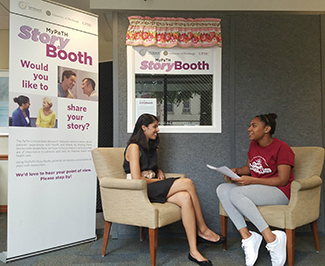Has the global COVID-19 pandemic been especially hard on you? Have you gotten the virus, cared for someone who has had COVID-19 or been forced to make tough decisions between your health and your job? If so, you are not alone. Many people have been affected by the virus and have stories to tell about their experiences—especially the caregivers among us.
During the COVID-19 global pandemic, it has become increasingly clear that the definition of essential caregivers includes more than health care professionals. People who work in grocery stores, food service, hospitality, child and elder care, retail, security and health care are also frontline workers—people who have been deemed essential to the economy or to the basic functioning of everyday life. These industries have been hit hard by COVID-19—either because of job loss or risk of exposure to the virus. Many of these essential jobs are held by African American women—67% of whom are, according to the Center for American Progress, their family’s primary income earners. Some caregivers have to go to work to support their families, which also increases their potential exposure and puts their families at risk. The stress on these caregivers has been intense, and many of them have a story to tell about their experiences in the past several months.
Story Booth is a research project that collects people’s stories and lived experiences. The project started in 2016 as a way to collect people’s personal stories about health experiences and share them with researchers.

“The mission of Story Booth is to promote patient-centered research,” says Kathleen M. McTigue, MD, MPH, MS, associate professor of medicine, University of Pittsburgh School of Medicine. “We wanted to make it easier to foster the development of research that addresses questions patients feel are important. Stories are just so powerful. They are an incredible way to communicate; they can cross cultures, and they’re a way to convey very technical information without using very technical language.”
People who volunteer to share their stories with Story Booth often record them over the telephone and agree to allow researchers to listen to the stories. The idea is that if researchers know what topics people think are important, researchers will design studies around those topics. Then, those studies can, hopefully, generate findings that may better people’s health.
Dr. McTigue, also associate professor of epidemiology at Pitt’s Graduate School of Public Health, explains that 72% of storytellers have expressed an interest in getting involved in health research as partners who help guide the research process. Story Booth researchers support team-building by introducing storytellers and researchers with shared health interests. She says, “Telling stories empowers people and helps them understand that their voices can be heard. My hope is that if we use community members’ stories as entries to conversations between them and researchers, it will help to establish a level of trust in a relationship that can move forward and be productive. Patients have such powerful lived experiences. Researchers have technical and literature-based experiences. When you put them together, there’s wonderful potential for learning new things. We’re hoping that storytelling can help form these relationships.”

In more recent stories submitted to Story Booth, people have shared stories about COVID-19—being ill with the virus, trying to access testing and trying to keep themselves or their loved ones healthy. The most common theme is that this is a very stressful time.
“People talk about how tremendously difficult it is to be struggling with this major health problem at the same time the country and the health system are also struggling with learning how to adapt to it,” says Dr. McTigue.
Frontline caregivers in the health care field also have an opportunity to be involved in the nationwide Healthcare Worker Exposure Response and Outcomes (HERO) registry. According to Dr. McTigue, the HERO registry is a collection of health care workers—doctors, nurses, respiratory technicians, people who work at front desks in hospitals or outpatient clinics, in food service or in hospital housekeeping—anybody in the course of their job who might be exposed to a patient who has COVID-19.
“Researchers hear what people in health care settings are worried about in this age of COVID-19,” says Dr. McTigue. “They’ve also built in a story-telling component. One of those most exciting parts is that anyone who joins the registry is able to learn about opportunities to get involved in COVID-19-related research. We’re hoping this is a way to help our local health care workers get access to studies that are addressing COVID-19 in various ways, including preventive trials.”
Dr. McTigue wants people to know that it is an important time to be involved with research.
“The only way we can find out what’s being done right and what people are worrying about is to actually talk with people, which is what the Story Booth is trying to do,” says Dr. McTigue. “We want to find ways to protect people who are at the highest risk for getting COVID-19, are going out every day to take care of others and who could really benefit the most from research—whether that’s to help them deal with stress or find vaccines to avoid infection.”
(To learn more about Story Booth, visit https://www.crhc.pitt.edu/PaTHStoryBooth/index.aspx. To find out how to become involved with the HERO registry, visit https://heroesresearch.org/)
RELATED:
2020 State of Black America: Pandemic exposes depth of America’s systemic inequality